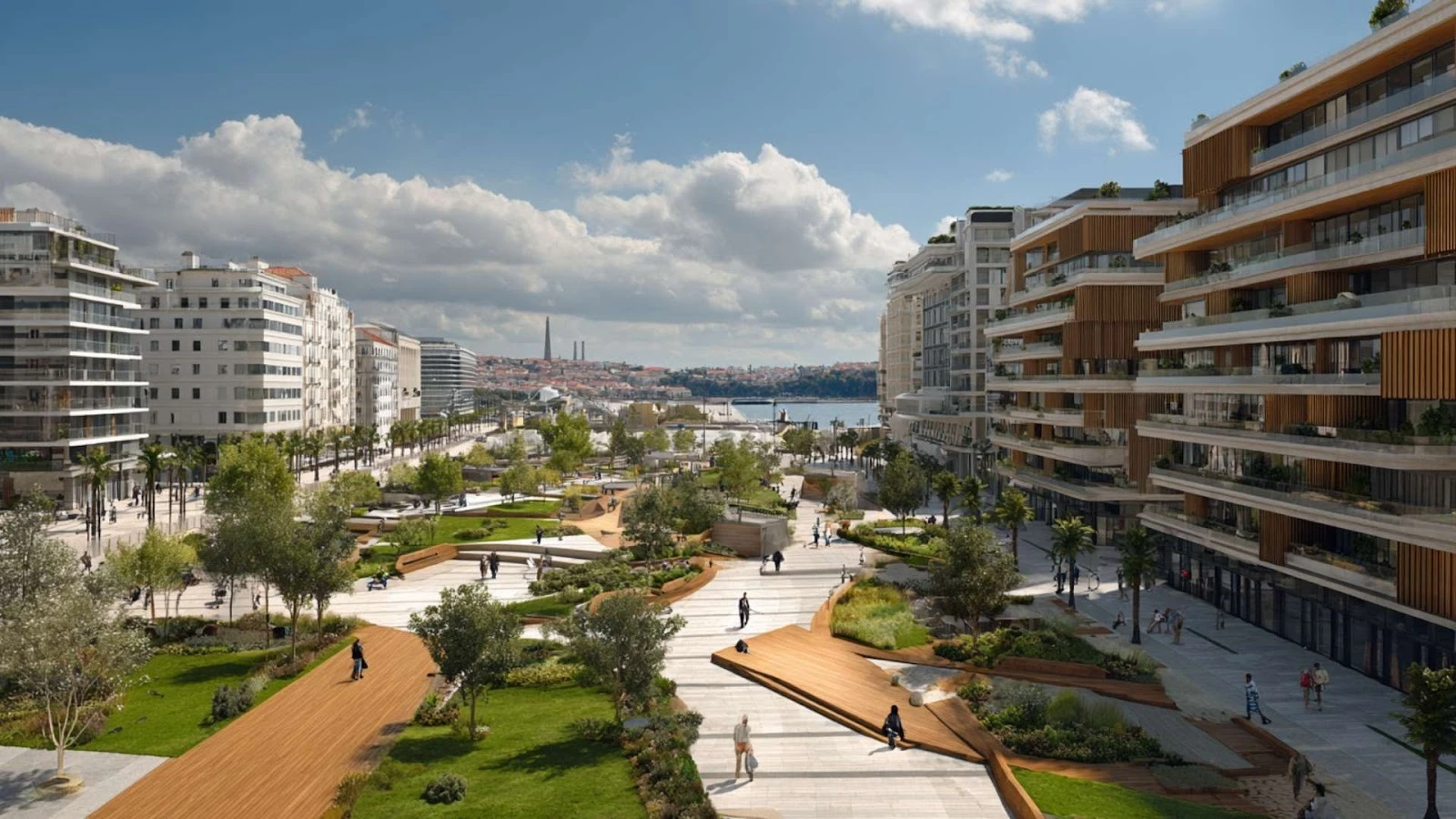The Portugal vs France 2025 real estate landscape is emerging as one of the most relevant discussions among European investors navigating a recalibrated property market. With the Eurozone entering a phase of moderate stability, investors are increasingly focusing on markets that combine manageable risk with sustainable yield. Both Portugal and France stand out as established destinations for cross-border capital, yet their 2025 market dynamics reveal diverging investment profiles shaped by policy, taxation, and demand fundamentals.
In 2025, as inflation stabilizes and borrowing costs remain elevated, investors are prioritizing efficiency and transparency in asset selection. France offers maturity and liquidity, but Portugal is gaining momentum as a cost-effective and investor-friendly alternative — particularly for those looking to buy property in Portugal for commercial or rental purposes. This article compares the two markets from an analytical, data-driven perspective to determine which offers stronger long-term value for real estate investors seeking strategic positioning in Europe.
Table of Contents
Market Overview: Portugal and France in 2025

Portugal: Moderate Growth, High Yields, and Investor Momentum
Portugal’s real estate market enters 2025 on solid footing, continuing its steady evolution from a niche destination to a mainstream European investment hub. Supported by consistent GDP growth, resilient tourism, and growing inflows of foreign capital, the country has built a reputation for combining affordability, regulatory transparency, and strong returns. The balance of these factors makes Portugal a leading contender for investors seeking to buy property in Portugal or diversify into commercial real estate in Portugal.
The Lisbon and Porto metropolitan areas remain the most dynamic submarkets, accounting for over 60% of transaction volume. While residential prices have risen steadily since 2019, Portugal’s pricing remains significantly below Western European averages, maintaining room for appreciation. The industrial and logistics segment continues to outperform, driven by the e-commerce and nearshoring sectors. Tourism-related assets — particularly in Lisbon, Porto, and the Algarve — benefit from record visitor numbers and resilient short-term rental demand.
| Indicator (2025 est.) | Portugal | Source |
| Average price per m² (Lisbon) | €5,800 | Idealista Q3 2025 |
| Average rental yield | 5.2% | Numbeo, 2025 |
| Share of foreign buyers | 13% of total transactions | INE Portugal, 2025 |
| GDP growth forecast | +1.8% | Eurostat, 2025 |
| Tourism growth YoY | +7% | Turismo de Portugal, 2025 |
Foreign capital continues to flow primarily into commercial and hospitality sectors, supported by business-friendly tax structures and simplified property registration. The ongoing development of innovation hubs and logistics corridors around Lisbon and Setúbal reinforces Portugal’s position as a strategically located market for both European and international investors.
Key market characteristics include:
- Moderate but consistent price appreciation across major cities.
- Above-average rental yields relative to Western Europe.
- Growing diversification beyond residential assets into logistics, retail, and hospitality.
- Continued appeal to remote professionals and digital nomads, sustaining urban demand.
France: Maturity, Liquidity, and Slower Growth
France remains one of Europe’s largest and most liquid property markets, backed by a deep pool of institutional capital and robust infrastructure. However, its 2025 outlook reflects a mature, low-yield environment, where investors trade flexibility for long-term security. Despite price stabilization after the 2023–2024 corrections, entry barriers remain high, particularly in core cities like Paris, Lyon, and Bordeaux.
The Paris region continues to dominate the national landscape, accounting for nearly 40% of total investment volume. However, transaction activity in 2025 has been tempered by higher financing costs and a cautious investor sentiment amid sluggish GDP growth. France’s rental yield compression — now averaging around 3% — underscores its positioning as a capital preservation market rather than a growth-oriented one.
| Indicator (2025 est.) | France | Source |
| Average price per m² (Paris) | €10,400 | MeilleursAgents, 2025 |
| Average rental yield | 3.1% | Deloitte Property Index 2025 |
| Share of foreign buyers | 6% | Notaires de France, 2025 |
| GDP growth forecast | +1.3% | OECD, 2025 |
| Inflation rate | 2.1% | Eurostat, 2025 |
While France’s real estate market 2025 offers stability and liquidity, investors must navigate higher acquisition costs, complex taxation, and stricter regulations, particularly in residential segments subject to rent controls. The commercial sector — especially in logistics and office assets — continues to attract institutional players, though yields remain compressed compared to Southern Europe.
Key market characteristics include:
- Mature, well-capitalized property ecosystem with high liquidity.
- Slower price growth and compressed yields in prime locations.
- Heavier tax and regulatory burden on property owners.
- Concentration of foreign investment in core urban and institutional-grade assets.
Overall, the European real estate comparison between these two markets reveals a clear distinction: while France delivers security and scale, Portugal offers greater yield efficiency, lower acquisition thresholds, and stronger growth potential. For investors weighing 2025 opportunities, Portugal’s data-driven fundamentals present a more agile and accessible alternative to France’s established but slower-moving market.
Investment Climate and Regulation

Portugal: Streamlined, Transparent, and Pro-Investor
Portugal’s investment climate in 2025 remains one of the most open and transparent in the European Union, with a regulatory system designed to encourage foreign direct investment. The country ranks among the top 20 globally in the World Bank’s Ease of Doing Business Index, reflecting efficient legal and fiscal processes for both individuals and corporations seeking to invest in property in Portugal.
Foreign investors benefit from a clear legal framework, straightforward property registration, and no restrictions on foreign ownership. The LDA (Private Limited Company) structure allows investors to manage property assets efficiently with a low compliance burden, while the Non-Habitual Resident (NHR) regime and competitive Corporate Income Tax (CIT) rates — starting at 17% for SMEs — enhance after-tax returns.
Key regulatory advantages include:
- Streamlined property acquisition and title registration via the Conservatória do Registo Predial.
- Transparent taxation, with no inheritance tax for direct family members.
- The Golden Visa program, which continues to incentivize commercial and corporate real estate investment.
- Favorable double taxation treaties with more than 70 countries.
These conditions make Portugal’s commercial real estate sector particularly attractive to investors from the UK, EU, and North America seeking tax efficiency and operational flexibility.
France: Complex Taxation and Regulatory Burden
In contrast, France’s real estate market 2025 operates within a more complex and heavily regulated environment. Although the country offers strong legal protection for investors, administrative and fiscal hurdles can significantly affect profitability. The total acquisition cost — including notary fees, stamp duty, and registration taxes — can reach 7–8% of the property’s value, while rental income is taxed progressively up to 45%.
Key regulatory challenges include:
- Strict rental controls in cities like Paris, Lyon, and Marseille limiting annual rent increases.
- High wealth and property taxes, including taxe foncière and IFI (impôt sur la fortune immobilière).
- Lengthy approval processes for building permits and zoning changes.
- Additional social contributions applied to rental and capital gains income for non-residents.
While France remains a stable and well-regulated market, its complex fiscal framework and rigid tenancy laws make it less agile than Portugal. For investors prioritizing yield and regulatory simplicity, Portugal’s legal and tax environment in 2025 offers a more efficient path to sustainable property investment.
Return on Investment and Market Segments

Commercial Real Estate
| Segment | Portugal (Lisbon/Porto) | France (Paris/Lyon) |
| Prime office yields | 4.8% | 3.2% |
| Retail yields | 5.5% | 3.8% |
| Logistics yields | 6.1% | 4.0% |
Portugal outperforms France in every commercial segment when it comes to yield, particularly logistics and hospitality assets benefiting from e-commerce and tourism recovery.
Residential and Short-Term Rentals
- Lisbon vs Paris property market: Lisbon’s mid-range apartment prices remain 40–50% lower, allowing investors to capture higher net returns.
- Tourism-driven demand in Lisbon, Porto, and the Algarve sustains occupancy rates of 70–80% in short-term rental units.
- France’s residential market continues to stabilize, but strict rental controls limit flexibility and profitability.
Market Outlook for 2025 and Beyond

Portugal: Sustainable Expansion and Strategic Growth
The outlook for Portugal’s real estate market in 2025 and beyond remains strongly positive, supported by a balanced mix of economic stability, growing international demand, and structural undersupply in key urban regions. The country continues to outperform the EU average in attracting real estate investment, particularly in the commercial and logistics sectors, which benefit from Portugal’s geographic position between Europe, Africa, and the Americas.
Key growth drivers include:
- Expansion of tourism and hospitality assets, with visitor numbers exceeding pre-pandemic records by 8% in 2025.
- Ongoing infrastructure projects such as Lisbon’s airport expansion and new logistics hubs in Sines and Leixões.
- Rising demand for flexible office spaces and co-living developments driven by remote work and international relocation.
- Stable political environment and transparent business regulation attracting EU and UK investors seeking to buy property in Portugal for both income and appreciation potential.
As interest rates gradually stabilize across the Eurozone, Portugal property investment 2025 is expected to remain yield-focused, with sustainable capital growth projected in the range of 4–6% annually across prime markets like Lisbon and Porto.
France: Stability with Limited Upside Potential
France’s real estate market enters the post-2025 period as a mature and stable environment, but one facing headwinds from demographic stagnation, higher operating costs, and persistent regulatory constraints. Core urban centers like Paris and Lyon will continue to see moderate price appreciation, but yield compression and taxation will cap short-term returns.
Outlook highlights:
- Steady institutional demand in office and logistics sectors, supported by corporate consolidation and e-commerce.
- Residential stagnation in secondary regions, where affordability and population decline limit growth potential.
- Gradual shift of investment interest toward green-certified and energy-efficient buildings, in response to EU sustainability directives.
- Inflation-adjusted yields likely to remain around 2.5–3.5%, below the European average.
Overall, the European real estate comparison shows a clear divergence: France offers long-term capital security, while Portugal provides a more dynamic balance between growth, accessibility, and yield. For investors targeting sustainable expansion rather than preservation, Portugal’s trajectory remains decisively favorable beyond 2025.
Conclusion: Which Market Wins in 2025?
In assessing the Portugal vs France 2025 real estate landscape, both markets demonstrate resilience and distinct investment appeal. France continues to offer scale, liquidity, and regulatory maturity, providing long-term security for institutional portfolios. However, its high acquisition costs, complex taxation, and modest yields make it less accessible for investors seeking flexibility and higher returns.
Portugal, by contrast, combines competitive entry prices, favorable tax conditions, and stronger yield performance, particularly across the commercial real estate and rental sectors. Supported by steady economic growth, investor-friendly policies, and expanding international demand, it stands out as one of the best countries for property investment in Europe. For global investors seeking to buy property in Portugal or diversify into high-performing European assets, the country’s 2025 outlook offers a compelling mix of growth, transparency, and long-term value.
For investors seeking expert guidance on where and how to buy property in Portugal, Roca Estate offers a comprehensive advisory approach built on market intelligence and proven results. From identifying high-yield commercial assets to managing the acquisition process, our team ensures every investment aligns with your financial goals. Contact Roca Estate to explore current opportunities and secure your position in Portugal’s thriving real estate market.

